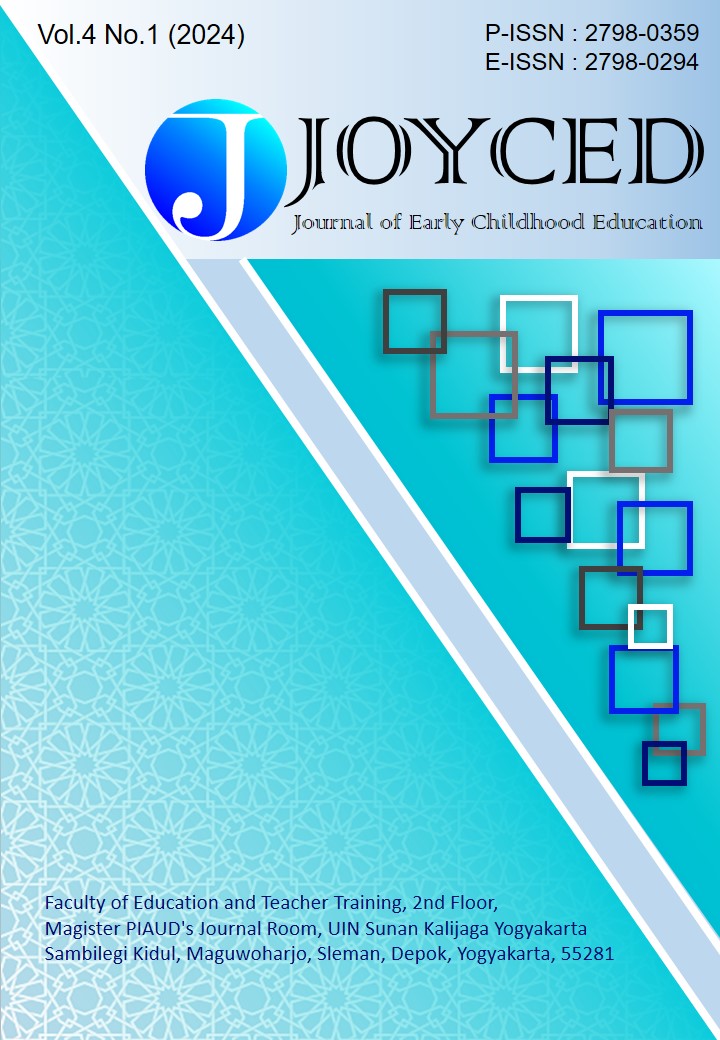The Evaluation of Kurikulum Merdeka with Context Input Process Product (CIPP) Model
DOI:
https://doi.org/10.14421/joyced.2024.41-04Keywords:
Evaluation, Curriculum, Kurikulum Merdeka, CIPPAbstract
Structured curriculum evaluation is part of advancing education in a country. Because of its efforts, it can improve the curriculum in the development stage as well as those that have been implemented. Thus making education in the country more prepared in the future. The purpose of this study is to determine the readiness of the implementation of a kurikulum merdeka in terms of context, input, process, and obstacles in its implementation. The method used is a qualitative method with research subjects in the form of teachers and students. Data collection techniques through curriculum documents, photos of activities, and questionnaire data of TK Plus An-Nur Peterongan. Analysis techniques by sorting data, presenting data, and drawing conclusions. The results of the research from the aspects of context, input, and process show that TK Plus An-Nur Peterongan is overall ready to implement a kurikulum merdeka with an independent category of change. This is evidenced by the results of the analysis of school needs to achieve educational goals, locally charged learning activities, strengthening the Pancasila student profile project, literacy, STEAM, ethical values, and identity through the intracurricular and extracurricular learning process and cooperation with the community environment. The obstacles to the implementation of the kurikulum merdeka found in the evaluation of the CIPP model seen from the input aspect are the quality of teachers who are not from the Kindergarten department and learning resources or media that are not fulfilled for the introduction of numerical literacy. This research contributes in the form of understanding and advice to teachers that evaluating the curriculum used by schools with the CIPP model can determine the readiness of the school or an obstacle in implementing the curriculum.
References
Al-Shanawani, H. M. (2019). Evaluation of Self-Learning Curriculum for Kindergarten Using Stufflebeam’s CIPP Model. SAGE Open, 9(1). https://doi.org/10.1177/2158244018822380
Arif, M., Sucipto, B., Anwar, S., & Samidi, R. (2022). Evaluasi Implementasi Kurikulum Darurat Di Satuan Paud Kota Tegal. JCE (Journal of Childhood Education), 6(2), 420–440. https://doi.org/10.30736/JCE.V6I2.1054
Arum, R. P., Putro, K. Z., & Jatmiko, A. (2023). Implementation of The Independent Learning Curriculum in Kindergarten. JOYCED: Journal of Early Childhood Education, 3(2), 88–97. https://doi.org/10.14421/joyced.2023.32-01
Aslan, M., & Uygun, N. (2019). Evaluation of preschool curriculum by stufflebeam’s context, input, process and product (CIPP) evaluation model. Egitim ve Bilim, 44(200), 229–251. https://doi.org/10.15390/EB.2019.7717
Felayati, & Yaswinda. (2019). Penerapan Model Evaluasi CIPPO dalam Mengevaluasi Penyelenggaraan Lembaga PAUD. Jurnal Obsesi : Jurnal Pendidikan Anak Usia Dini, 4(1), 30–40. https://doi.org/10.2/JQUERY.MIN.JS
Hakan, K., & Seval, F. (2011). CIPP evaluation model scale: Development, reliability and validity. Procedia - Social and Behavioral Sciences, 15, 592–599. https://doi.org/10.1016/j.sbspro.2011.03.146
Inayati Ummi. (2022). Konsep dan Implementasi Kurikulum merdeka pada Pembelajaran Abad-21 di SD/MI. ICIE: International Conference on Islamic Education, 2(0), 293–304. https://doi.org/10.51169/IDEGURU.V7I1.307
Jamjemah, J., Djudin, T., Erlina, E., & Hartoyo, A. (2022). Analisis Kesiapan Guru dalam Melaksanakan Pembelajaran Kurikulum merdeka di SDN 47 Penanjung Sekadau. JURNAL PENDIDIKAN DASAR PERKHASA: Jurnal Penelitian Pendidikan Dasar, 8(2), 119–127. https://doi.org/10.31932/jpdp.v8i2.1722
Jiang, H., & Liu, Y. (2021). Construction of teaching quality evaluation system of higher vocational project-based curriculum based on cipp model. International Journal of Information and Education Technology, 11(6), 262–268. https://doi.org/10.18178/ijiet.2021.11.6.1521
Lestari, S. R. I. (2020). Evaluasi Kurikulum Dan Pembelajaran Disusun Oleh. 0–9.
Mariam, S., & Sukirman, D. (2021). Fungsi Manajemen Kurikulum Pendidikan Anak Usia Dini (PAUD). Inovasi Kurikulum, 18(2), 208–221. https://doi.org/10.17509/jik.v18i2.36457
Masykur, R. (2019). Teori Dan Telaah Pengembangan Kurikulum. In Aura Publisher (Issue September).
Mundiri, A., & Hasanah, R. U. (2018). Inovasi Pengembangan Kurikulum Pai Di Smp Nurul Jadid. Tadrib: Jurnal Pendidikan Agama Islam, 4(1), 40–68. https://doi.org/10.19109/tadrib.v4i1.1721
Ningsih, I., & Mawardi, I. (2021). Evaluasi Penerapan Kurikulum Paud 2013 Dengan Teknik Cippo Di Ra Fairuz Aqila Dan Tkit Ukhuwah Islamiyah. PROCEEDING UMSURABAYA, 1(1). https://doi.org/10.21009/JIV.1202/8
Palupi, S. (2013). Evaluasi untuk Pengembangan Kurikulum SMK. 97–106.
Pujiastuti, P., Herwin, H., & Firdaus, F. M. (2021). Thematic learning during the pandemic: CIPP evaluation study. Cypriot Journal of Educational Sciences, 16(6), 2970–2980. https://doi.org/10.18844/cjes.v16i6.6481
Qondias, D., Wunggo Kaka, P., & Infiolata Nau Program Studi Pendidikan Guru Sekolah Dasar STKIP Citra Bakti Ngada-NTT, M. K. (2018). Studi Evaluasi Kurikulum 2013 Tingkat Sekolah Dasar di Wilayah Timur Indonesia. JURNAL PENDIDIKAN DASAR PERKHASA: Jurnal Penelitian Pendidikan Dasar, 4(1), 63–72. https://jurnal.stkippersada.ac.id/jurnal/index.php/JPDP/article/view/15
Rosmana, P. S., Iskandar, S., Kiranti, D. I., Febriyanti, I., Farradhillah, S. Q. A., & Sari, Y. (2022). Urgensi Pengembangan Kurikulum Dalam Pendidikan Siswa Sekolah Dasar. JURNAL PENDIDIKAN DASAR PERKHASA: Jurnal Penelitian Pendidikan Dasar, 8(1), 50–70. https://doi.org/10.31932/jpdp.v8i1.1551
Sagin, A., Balmer, D., Rose, S., Musheno, R., Olenik, J. M., Dingfield, L., Dine, C. J., & Bennett, N. L. (2023). Evaluation of a Palliative Care Longitudinal Curriculum for Medical Students Using the Context-Input-Process-Product Model. American Journal of Hospice and Palliative Medicine, 0(0), 1–9. https://doi.org/10.1177/10499091231165504
Sopha, S., & Nanni, A. (2019). The cipp model: Applications in language program evaluation. Journal of Asia TEFL, 16(4), 1360–1367. https://doi.org/10.18823/asiatefl.2019.16.4.19.1360
Tusyana, E., Markhumah, U. F., & Fatmawati, E. Y. (2020). Implementasi Kurikulum Madrasah Diniyah Di Asrama Putri Iv Pondok Pesantren Darul Ulum Jombang. Tadrib, 6(1), 13–27. https://doi.org/10.19109/tadrib.v6i1.4193
Ulfadhilah, K., Nurlaela, N., & Sukiman, S. (2021). Implementasi Kurikulum 2013 (Terpadu) Di RA Baiturrahman Bima Cirebon. Pratama Widya : Jurnal Pendidikan Anak Usia Dini, 6(1), 47. https://doi.org/10.25078/pw.v6i1.2021
Utami, C. P., & Eliza, D. (2022). Pengaruh Loose Parts Play Terhadap Pengenalan Konsep Angka Anak Usia 5-6 Tahun Di TK Mutiara Ceria Pasaman Barat. JECED : Journal of Early Childhood Education and Development, 4(2), 183–191. https://doi.org/10.15642/jeced.v4i2.2244






.png)











